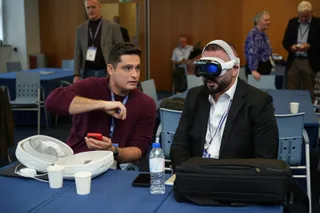Government-Developed Serious Games Lead the Field
Contact Our Team
For more information about how Halldale can add value to your marketing and promotional campaigns or to discuss event exhibitor and sponsorship opportunities, contact our team to find out more
The Americas -
holly.foster@halldale.com
Rest of World -
jeremy@halldale.com

This year's Serious Games Showcase & Challenge (SGS&C) announced and recognized the 2016 winners at the Interservice/Industry Training, Simulation and Education Conference (I/ITSEC).
This year's 20 finalists were showcased on the floor during the four-day I/ITSEC show, where close to 15,000 attendees had the opportunity to play a diverse cross-section of serious games developed by business, government and students in subject matters that ranged from medical professional training to rocket simulation to learning and managing debt.
But the serious games that seemed to capture the attention of the I/ITSEC attendees was US Army STARS: Elements, one that helps students learn and visualize the foundations of chemistry through interactive models, games, and challenges. US Army STARS: Elements was voted on by attendees as their favorite game, earning them the prestigious People's Choice Award.
Developed by the US Army Game Studio, Software Engineering Directorate, US Army STARTS: Elements was also awarded the best in mobile and won the Students' Choice category, with more than 1,000 evaluations received by students in Orange County Public Schools.
A new category added this year was the Innovation Award, which recognizes characteristics or techniques that enhance the serious game in a new or different way. These techniques can be hardware integration, instructional design, game design, content topic, or a combination thereof.
The innovation committee felt that two games were deserving of this honor in its inaugural year.
"Ironically, we saw virtually the same innovation from two teams: both teams focused on helping amputees practice skills related to using their prosthetic by driving gameplay through muscle use," said SGS&C director, Jenn McNamara. "One team used a device agnostic approach for high-end myoelectric prostheses, and the other team worked with the non-profit organization, Limbitless Solutions and their 3D, affordable prosthetics for children." The two winners are ADAPT-MP by Design Interactive, Inc., and Limbitless Training Games by University of Central Florida.
The other category winners in this year's contest were:
- Best Business - Post Attack Reconnaissance (PAR) Virtual Training Mode by the Virtual Heroes division of Applied Research Associates was developed to help Air Force members become familiar with what normal and post-attack looks like.
- Best Government - USC Standard Patient by the Army Research Lab developed by the USC Institute for Creative Technologies and BreakAway Games allows players to practice their medical interviewing and diagnostic skills on virtual patients with helpful coaching.
- Best Student - Bots & (Main)Frames by New York University Tandon School of Engineering helps players develop programming and computational thinking skills.


